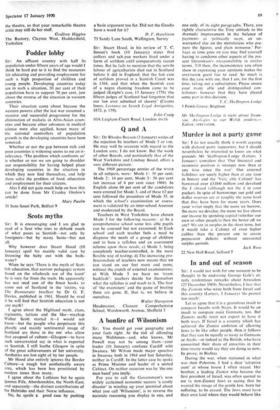Scots myths
Sir: It is encouraging and I am glad to read of a Scot who tries to debunk much of what poses as Scottish—not only by foreigners—but by many Scots—but not all.
Why however does Stuart Hood (10 January) spoil his mainly valid case by throwing the baby out with the bath- water?
When he says 'There is the myth of Scot- tish education, that narrow pedagogic system based on the wholesale use of the tause' he is very far from the truth. He apparently has not read one of the finest books to come • out of Scotland in the 'sixties, viz The Democratic Intellect by Dr G. E. Davies, published in 1961. Should he read it he will find that Scottish education is not any myth!
I agree about the Highland myth, clans, regiments, tartans and the like--rnayhap Walter Scott started it—I would not know—but the people who perpetuate this ghastly and mainly sentimental image of Scotland are those in the BBC who allow that cesspool of culture—Glasgow—to have such unwarranted say in what is exported as Scottish. I still loathe Glasgow in spite of the great achievements of her university. Aesthetics are lost sight of by her people.
Mr Hood also entirely ignores the Border Culturea rough but aesthetically aware area, which has been less prostituted by modern times than many.
I agree about the Lothians but he again ignores Fife, Aberdeenshire, the North-East; and separately—the distinct contributions of the Hebrides and their Norse influence.
No, he spoils a good case by pushing a basic argument too far. Did not the Greeks have a word for it?
D. F. Hutchison 73 Sandy Lane South, Wallington, Surrey
Sir: Stuart Hood, in his review of T. C. Smout's book (10 January) states that colliers and salt-pan workers lived under a form of serfdom until comparatively recent times. But he fails to mention that the servile labour of agriculturists died out in Scotland before it did in England, that the last case of serfdom proved in a Scottish Court was in 1364, and that when the Scottish case of a negro claiming freedom came to be judged (Knight's case, 15 January 1778) 'the fifteen judges of Scotland had forgotten that OW law ever admitted of slavery' (Cosmo Innes, Lectures on Scotch Legal Antiquities, 1872, p. 159).
John Craig 10A Leigham Court Road, London swl6


































 Previous page
Previous page